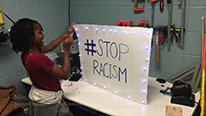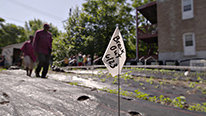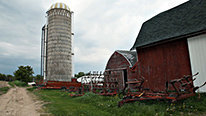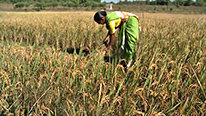- Makeda Cheatom
- Executive Director
- Supporting Equitable Approaches for Co-created Research from the Ground Up
- http://power30icbos.blogspot.com/
- WorldBeat Cultural Center
- Marilu Lopez Fretts
- Bilingual Community Outreach Specialist
- Supporting Equitable Approaches for Co-created Research from the Ground Up
- http://power30icbos.blogspot.com/
- Cornell Lab of Ornithology
- Karen Purcell
- http://celebrateurbanbirds.org/
- Project Director
- Supporting Equitable Approaches for Co-created Research from the Ground Up
- http://power30icbos.blogspot.com/
- Cornell Lab of Ornithology
- Bobby Wilson
- CEO
- Supporting Equitable Approaches for Co-created Research from the Ground Up
- http://power30icbos.blogspot.com/
- Metro Atlanta Urban Farm
- Tanya Zwald
- https://www.linkedin.com/in/tanya-zwald-15b9807a/
- Youth in Action (YA!) Program Manager
- Supporting Equitable Approaches for Co-created Research from the Ground Up
- http://power30icbos.blogspot.com/
- Comunidades Latinas Unidas en Servicio (CLUES)
Public Discussion
Continue the discussion of this presentation on the Multiplex. Go to Multiplex











Melissa Demetrikopoulos, Ph.D.
I am very interested in this topic and we recently presented about this at the Citizen Science Association meeting (Ethical Protocols for the Recognition and Engagement of Citizen Scientists and Their Data). I am especially interested in ways to enhance engagement of citizen scientists in areas they are often excluded from including 1.Representing and interpreting findings, 2.Proposing modifications to protocols, and 3. Future directions. The issues of ownership, access, and analysis of data and the collaborative determination of the direction of research questions are critically important for greater engagement of citizen scientists and I am wondering how your project might inform these questions?
Karen Purcell
Project Director
Hi Melissa,
We created our Community-Review Board of Non-negotiables to help guide us. We believe that it should not be dominant culture institutions that "allow" access or modification of protocols, but that it should be the underserved communities themselves that are equal partners in the decision-making from the very beginning. Please check out our project non-negotiables and our ICBO Working Agreements. I hope this is helpful.
Marilu Lopez Fretts
Marilu Lopez Fretts
Bilingual Community Outreach Specialist
Hi Melissa,
Thank you for watching our video. We are happy you are interested in ways to enhance engagement in areas from which communities have been excluded. Our approach was to use community-based participatory research with grounded theory approaches. Our mission, vision, rules based on Jemez Principles community review board of non-negotiables guide our work. The research comes from the community and it is co-lead, co-created with our institution. Our project has informed our work.
Below is our COMMUNITY REVIEW BOARD NON-NEGOTIABLES
*Equity: Providing the structure, tools, respect, and support needed to give each member the same opportunity to succeed. Working for equity also means identifying and fighting forces and systems that limit opportunities and outcomes.
I hope this helps!
Thanks.
Carrie Schuman
Hi Marilu, I find a lot of the details you mention in this response intriguing. I'm always curious about using arts in meaningful ways to engage in science storytelling and as alternative ways to communicate research results. Are there places to see some of the outcomes you mention (examples of the posters, etc)? Are you communicating results in more standard academic/scientific communities? (Obviously, I understand this showcase could be considered a good example, though obviously there may be a diverse audience!). In those cases, how are you choosing to talk about this work?
Marilu Lopez Fretts
Bilingual Community Outreach Specialist
Hi Carrie,
Thank you for watching our video! From the beginning of our work it was clear that academic language was a barrier between the institution and the communities in a collaboration. When the ICBOs began their strand of research, we wanted to communicate in ways we could be inclusive and understood by anyone in our communities. The arts have overcome any barrier and have universal reach, are welcoming and provide creative ways of expression that can reach more people of all backgrounds and bring attention to what we want to communicate.
You can find some examples on our blog: https://power30icbos.blogspot.com/
-Inequitable Collaborations: the need for full access: https://www.youtube.com/watch?v=7RqTg_goY24
-Walking on Eggshells, visually explained: https://power30icbos.blogspot.com/2019/03/walki...
-Our posters: https://power30icbos.blogspot.com/search/label/...
Thanks!
Marilú
Cara Duncan
Community involvement, right from the beginning, in research is invaluable! You have identified (perhaps fostered) an engaged core of community members. How did you identify these community members? And what was the process for co-creating the research project? Thank you!
Karen Purcell
Project Director
Hi Nikki,
We agree that community involvement from the very beginning is invaluable. This is a community-led project, and we have been working together for approximately five years. We've created a framework to guide our research and our decision-making. We are in the first year of the project and are in the midst of co-creating! We meet weekly and primarily focus on process.
Marilu Lopez Fretts
Bilingual Community Outreach Specialist
Thanks, Karen. I would also like to add that we met the community researchers years ago through the Cornell Lab of Ornithology’s citizen science project Celebrate Urban Birds (CUBs). It all started when they got a mini-grant award from CUBs to create an event in their community and participate in the citizen science project. That was the beginning of the relationship. Years later, when we got an NSF award for a collaborative research project, we brought a group of those community members as advisors to the project. A year later, feeling that academic language was a barrier that made communities feel studied and did not provide meaningful access to the research or that they could use, in a practical way, in their communities, they began their own strand of research using community-based participatory research and grounded theory approaches.
The process for co-creating the research project includes meeting several times a month and staying in touch. We also hold in-person meetings at least twice a year. The decisions are made collectively and we strive to make sure every voice is heard. To accomplish this, we use different ways to make sure everyone is heard. We also follow the Jemez Principles and our working agreements.
Catherine Pham
Camellia Sanford-Dolly
Senior Research Associate
I am interested in the framework that you developed - What are the non-negotiables that were identified and how does attending to them play out in practice?
Karen Purcell
Project Director
Our framework guides our research and decision-making and our Community Review Board of Project Non-negotiables and Working Agreements help guide our process.
We developed these in our in-person meetings and worked together to come to common understandings of what these terms mean. It's a process!
We feel that it is important for us to review and adjust these agreements and non-negotiables over time and depending on context.
Jake Foster
Founder
Thank you for sharing an overview of your work. This is an important topic. I've been following related discussions about indigenous knowledge in the science education research community, and see similar discussions about how different types of knowledge can be recognized and valued, and how to include and protect a community's knowledge.
I appreciate the link above, provided by Karen, to the project non-negotiables. Like Camellia, I am very interested in the framework that you have developed. How is your framework built off of, or different from, models of Public Participation in Scientific Research (PPSR)? Or more specifically, how does your framework attend to or focus on under-served communities?
Makeda Cheatom
Founder / Executive Director
Greetings Jake,
Thanks for your interest in our research. My name is Makeda and I'm the Executive Director of the WorldBeat Cultural Center in San Diego, CA. I am one of the community leaders representing underserved communities throughout the USA that has been participating in the project. We call ourselves Independent Community Based Organizations (IBCOs). Our research has been co-created from the beginning. Together we created the survey that we shared amongst 30 community organizations to better understand the challenges in fostering equity, diversity and inclusion in STEM research. Together we analyzed the data, named the results, and created a workbook to guide both Informal Science Educators and Community Based Organizations through their collaborations. Most recently in the last 2 years, we've presented our results and workbooks throughout various conferences throughout the nation. Now we are putting these results into practice on a noise pollution project where four of us are co-principle investigators. Each of our respective communities also has participating Community Science Collaborators as key players in the project where they are co-creating the noise pollution app so that its relevant to everyone. Being authors and presenters of our own research has empowered us and our communities. We have all adopted or implemented our research and values in our own unique way into our organizations and collaborations.
In our research, we found that Power and Privilege and Trust and Transparency are key themes that come up when trying to understand collaborations between Informal Science Institutions and Community Based Organizations. Community Based Organizations felt used by the dominant culture institutions coming into their communities and 'using' them for grants and research. Many communities feel that in their collaborations they were being 'studied' with no benefit for them in the long run and that's one of the problems that creates mistrust. Research participants from underserved communities did not have access to grant writers, developers, foundations like the dominant culture institutions. This is what constitutes Power and Privilege. Having a commitment to Equity, Diversity and Inclusion is necessary to have meaningful collaborations between Informal Science Educators and Community Based Organizations.
Marilu Lopez Fretts
Marilu Lopez Fretts
Bilingual Community Outreach Specialist
Thanks, Makeda! Like Makeda mentioned, the framework came from the community, not from dominant culture literature, therefore, its focus is to benefit underserved communities and it is guiding our current project.
Breanne Litts
Assistant Professor
Thank you so much for sharing this work! What a great project. I know this work will be so inspirational to many!
I'm curious to know more about how the project got started. I find some of the tensions outlined in this work is that the researchers still initiate the project idea. I get the sense your story is different. Can you share more about that?
I also wonder what sort of insights you could provide to others who want to initiate or are currently engaging in this work. In addition to the framework you share above, what has your team learned so far? How have you been able to ensure that the project remains rooted in a true partnership rather than communities feeling "studied" as Makeda mentions above.
This video is done really well, too! I love all the voices represented throughout the video while still feeling cohesive.
Marilu Lopez Fretts
Bilingual Community Outreach Specialist
HI Breanne,
Thank you for watching our video. The ICBOs lead this work because we are frustrated by academic language, lack of access to funding and networks, and feeling we have no voice in the sciences. Over the years we have felt studied by science institutions and funding agencies that we feel do not provide meaningful access to research that we could use, in a practical way, in our communities. We began our work using community-based participatory research and grounded theory approaches because of our frustration with the sciences and scientific institutions.
The process for co-creating the research project is not easy. It means having many meetings (virtually and in -person) and really focusing on process. We are learning each step of the way. The decisions are made collectively and we strive to make sure every voice is heard. Everyone contributes something different and when we bring it all together – it works! It’s messy, and beautiful.
In choosing the focus of our work in this NSF award, we talked about issues of interest and concern within our communities. We all agreed that noise pollution was a theme that we wanted to explore. We began gathering existing information and learning about the topic and began co-creating the proposal that ultimately was awarded by the NSF.
Catherine Pham
Hi everyone, I'm Catherine, and I am one of the community researchers who is part of the ICBO (independent community based organizations) group. As Marilu said, many of us in our group originally interacted with Cornell because we had received mini-grants through the awesome Celebrate Urban Birds program. Go CUBS! (https://celebrateurbanbirds.org). We're from all parts of the U.S. (and now Mexico) and while our agencies do really different kinds of work (youth, bilingual elementary school, theater for kids, cultural center, homeless services, mental health, community gardening, and many more), as we got to know each other more we found that we had really common experiences when working with larger science institutions and universities. So in addition to other pieces of work we were doing, we decided to join forces, do research, and create the workbook that Makeda describes above. (Really! Click the link on Makeda's May 14 post - our workbook is AWESOME!). I'm not sure how to answer all of the questions above, but I will say that for myself, I joined this project initially because I believe that everyone (in my case, including people who lived outside, people who have mental health issues, and people from underserved communities) should have access to science and can contribute in a meaningful way. Our group has done our research with a lens of equity, diversity, and inclusion and has produced powerful results. Please take a look at our materials and know we are happy to answer your questions, whether from a research or "boots on the ground" perspective. Thanks!
Marilu Lopez Fretts
Rebecca Roberts
Fantastic project! So many levels of engagement.
Marilu Lopez Fretts
Bilingual Community Outreach Specialist
Thank you, Rebecca!
Bobby Wilson
CEO
Progress is our most important product
It is through the Lab of Ornithology at Cornell University and the National Science Foundation (NSF) that change is on its way.
Four community leaders are now Co Principal Investigators ( CO-PI’s ) of a national science project called “noise pollution”. This is a major change for the four CO-PI’s that are community based and to the best of my knowledge, this is a major change for the NSF. As CO-PI’s we are working diligently to make sure that our community voices are heard and that this research will have a positive impact upon each one of our communities, NSF as well as the CO-PI’s.
Join us in this most important product “positive change”.
Marilu Lopez Fretts
Marilu Lopez Fretts
Bilingual Community Outreach Specialist
Thanks, Bobby. Indeed, a very important step to see community leaders as Co-Principal Investigators. Looking forward to seeing more community voices elevated in other projects like the ones in this showcase!
Jomo Mutegi
Marilu, I love the non-negotiables you shared. Excellent work!
Marilu Lopez Fretts
Bilingual Community Outreach Specialist
Thank you, Jomo! It is an honor to be working with this amazing group.
Further posting is closed as the showcase has ended.